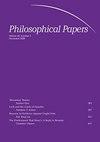Learning, Acquired Dispositions and the Humean Theory of Motivation
IF 1.3
3区 哲学
0 PHILOSOPHY
引用次数: 1
Abstract
Abstract A central point of contention in the ongoing debate between Humean and anti-Humean accounts of moral motivation concerns the theoretical credentials of the idea of mental states that are cognitive and motivational at the same time. Humeans claim that this idea is incoherent and thereby unintelligible (M. Smith, The Moral Problem, Blackwell 1994). I start by developing a linguistic argument against this claim. The semantics of certain ‘learning to’ and ‘knowing to’ ascriptions points to a dispositional state that has both motivational and cognitive properties: habitual knowledge, as we may call it. But there is nothing unintelligible or incoherent about such ascriptions as they figure in the explanation and assessment of action. This suggests that the idea of a state that has both cognitive and motivational properties is not an artefact of philosophical speculation. Moreover, I suggest that action explanations that appeal to habitual knowledge, which are a variety of habit explanation, present distinctive problems for Humean accounts. The discussion bears on the relationship between habitual knowledge and knowing-how, and its possible significance for anti-Humean accounts of moral motivation.学习、后天倾向与休谟动机理论
在休谟和反休谟关于道德动机的争论中,一个争论的焦点是关于同时具有认知性和动机性的精神状态这一观点的理论依据。休谟主义者声称这种观点是不连贯的,因此是不可理解的(M. Smith, The Moral Problem, Blackwell 1994)。我首先提出了一个反对这种说法的语言学论证。某些“学习到”和“知道到”归属的语义指向一种同时具有动机和认知特性的性格状态:我们可以称之为习惯性知识。但是,在解释和评价行动时,这些归因并没有什么不可理解或不连贯的地方。这表明,既具有认知特性又具有动机特性的国家概念并不是哲学思辨的产物。此外,我认为诉诸习惯知识的行为解释是各种习惯解释,这给休谟的解释带来了独特的问题。本文讨论了习惯知识与知识之间的关系,以及它对反休谟道德动机解释的可能意义。
本文章由计算机程序翻译,如有差异,请以英文原文为准。
求助全文
约1分钟内获得全文
求助全文
来源期刊

Philosophical Papers
PHILOSOPHY-
CiteScore
2.10
自引率
0.00%
发文量
18
期刊介绍:
Philosophical Papers is an international, generalist journal of philosophy edited in South Africa Original Articles: Articles appearing in regular issues are original, high-quality, and stand-alone, and are written for the general professional philosopher. Submissions are welcome in any area of philosophy and undergo a process of peer review based on initial editor screening and refereeing by (usually) two referees. Special Issues: Topic-based special issues are comprised of both invited and submitted papers selected by guest editors. Recent special issues have included ''Philosophy''s Therapeutic Potential'' (2014, editor Dylan Futter); ''Aging and the Elderly'' (2012, editors Tom Martin and Samantha Vice); ''The Problem of the Criterion'' (2011, editor Mark Nelson); ''Retributive Emotions'' (2010, editor Lucy Allais); ‘Rape and its Meaning/s’ (2009, editor Louise du Toit). Calls for papers for upcoming special issues can be found here. Ideas for future special issues are welcome.
 求助内容:
求助内容: 应助结果提醒方式:
应助结果提醒方式:


